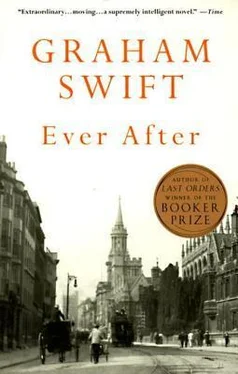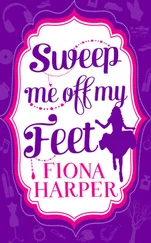So it was she who seduced him? It’s funny how the memory blurs. And as for the kids — there were no kids. Only in the mind. Only the two miscarriages — memory doesn’t mix matters here. Then nothing.
And maybe it’s around this time — the time of the second miscarriage or the time of the publication of his abortive book — that Potter begins to wonder whether, in any case, this scholar’s life is really for him. This contemplative life. This life of the mind. When you are sitting at home by the fire …
It is a well-known fact that the Potter marriage is a façade, of which the relentless people-collecting and opportunity-seeking and throwing of dinner parties are compensatory symptoms. The marriage may have died, but the wake goes on — and how many perfectly thriving couples could generate such buzz and esprit ? It is generally known and accepted that Potter’s academic and extra-academic adventurism has been at the expense of domestic harmony. In a word, that Potter screws around.
It is also generally known that Katherine Potter knows that Potter screws around, and somehow accepts or submits to the fact, is long-suffering and diplomatic about it, and has not taken up other options open to her. Such as screwing around herself. Though she is eight years younger than Potter and still undeniably attractive. Undeniably attractive. But I can be pretty sure — in fact, I can be certain — that Katherine Potter has never once in her life committed an act of adultery. Not once.
Time goes by. A new Potter emerges out of the fragile, if still intact, fabric of his marriage: radio and TV pundit, would-be celebrity, but also (the scholarly career has not been entirely forgotten) Fellow of this worthy College.
Then there appears on the scene a figure of dubious credentials if intriguing provenance: the Ellison Fellow. He is briefly courted by the Potters (among others), then dropped — the man has only a borrowed lustre. But then, following the death of his mother, he acquires a certain set of notebooks, hereafter referred to as the Pearce Notebooks. And, after a period of dwelling extensively on their contents, makes the mistake of showing them to Potter. And Potter makes the mistake of not making a copy.
Once again, but for different reasons, the Ellison Fellow is pursued. After some initial exchanges of surprising animosity (it seems that Potter feels that the Notebooks are best left with him, but the Ellison Fellow demands them back, makes three copies of his own and keeps them under lock and key), Potter is anxious to smooth relations. The invitations and blandishments begin again. Furthermore, by the personal example of his renewed friendliness, Potter is at pains to uphold the Ellison Fellow’s status, by now somewhat open to question, as a genuine and good Fellow. He is doing “serious work” after all, something really rather special. In short, having missed his chance simply to grab the Notebooks, Potter sets about trying to wheedle them into his possession.
Now, throughout this period, let it be noted, even during the interval of his relative ostracism, Katherine Potter has maintained an unbroken interest in the Ellison Fellow. It seems (you will find this hard to believe, even harder if you were to take one look at me now) that for her he has the stubborn attributes of a Romantic Figure. Which perhaps only means that Katherine Potter (despite everything) is a Romantic Soul. It is true, as previously observed, that he arrives in his new quarters with a certain aura of glamorous pathos, or rather, pathetic glamour, with a certain poetically construable personal baggage, positively Tennysonian in its freight of dolour. But this was at the beginning. And time— And surely, in the end, as we all know, poetry is one thing and life is another. These big, sonorous, laden words, how inflated and archaic they sound, as if they could only belong to literature: heartache; sorrow; grief.
And as for the Ellison Fellow’s feelings towards Katherine Potter — to be honest, they involve a good deal of confusion. He reacts before Katherine Potter, in fact, as he has reacted before all new, strange (attractive) women who happen, since a certain event, to have crossed his path. He does not know how to deal with them. He is filled with dismay, a giddy sense of arbitrariness, an apprehension that the universe holds nothing sacred; all of which is only to be stilled by the imperative of loyal resistance.
He is not immune to the prickle of passing lust. But he deals defensively with it. He reacts either with disdainful dismissal (Not your type, definitely not your type) or with a rampant if covert seizure of lecherousness (Christ, what tits! What legs! What an arse!), which serves the same forestalling function by reducing its object to meat and its subject (he is past fifty, after all) to a pother of shame.
But none of this — so much as is apparent — deters Katherine Potter’s interest. Rather, it stimulates it. If someone is on their guard, then you know there is something to be guarded. Somewhere, if it is only within the hidden vaults of memory, there is treasure. You see, in this hotbed of sophistry and pedantry, Katherine Potter applies simple instinct and logic. She sees that if the Ellison Fellow is unhappy, it is because he was, once — happy.
And one night, when, thanks to the Pearce Notebooks, the invitations to the Potter home have been renewed, Katherine Potter touches the Ellison Fellow’s wrist with the fingertips of one hand and even runs the fingertips, just a little bit, brushing the hairs, up his forearm — a gesture that strikes him, among other things, as simultaneously impetuous and calculated, and certainly audacious, since there are several other people in the room at the time (though only one sees).
But this is not before the Ellison Fellow has been subjected to a concerted campaign of persuasion, across the dinner table, to release his close-kept manuscripts, there being among the assembled guests at least two other members of the History Faculty, previously briefed, no doubt, and there to voice the wider view of the Faculty that, with all due respect, he might not be the best man for the job, etc., etc. To which he responds, let it be said, with unbudging tenacity. And not before, unobserved himself, he has observed, in the kitchen (this will give some idea of the fluid nature of Potter’s soirées and his delight in mixing old and young), Potter with his hand firmly on the left buttock of one of his guests, a research graduate called Gabriella (black eyes, black hair; flashing, Italian glances), who is definitely not, as it happens, the Ellison Fellow’s type.
And whereas Potter did not know that he was observed with his hand on Gabriella’s buttock (let us be plain, his hand was thrust beneath the waistband of her undeniably fetching, tight black evening trousers, so we are not talking about the seat of her pants), it is clear to the Ellison Fellow that Potter sees Katherine, his wife, put her hand on his, the Ellison Fellow’s, wrist and, what’s more, that Katherine knows it, and doesn’t take her hand away. Which makes the Ellison Fellow, who still likes to put into his thoughts the words, if not of Hamlet, then (more appropriately perhaps) of Polonius, think springes to catch woodcocks. But since she does not take her hand away, he is forced to look into her eyes. They are blue-grey eyes. His eyes are grey. Gabriella’s eyes are black. His dead wife’s were seaweed-brown. How strange that we each have these different eyes, like jewels set in our bodies, and that when we look into someone’s eyes we think we can see who they are. These are not the eyes of a natural temptress. They seem to be pleading for his co-operation and at the same time to be saying, “I know, I married the wrong man.” And he cannot tell if she is acting.
Читать дальше












